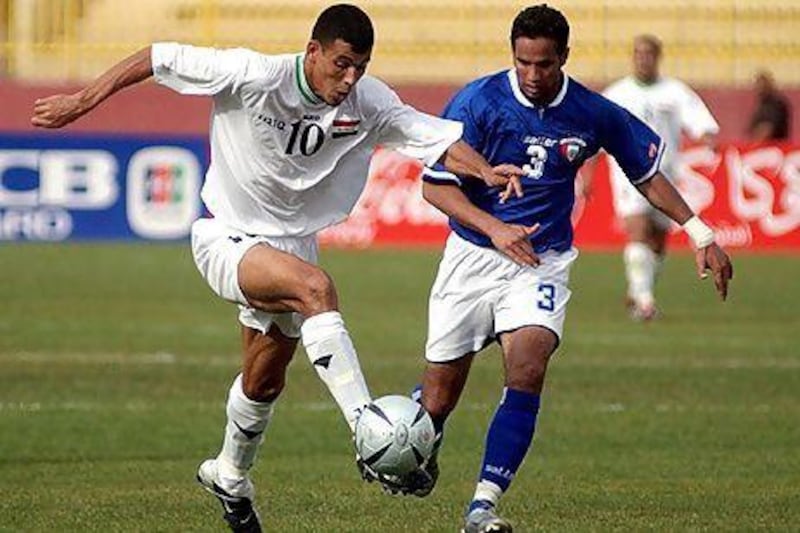The start of the Gulf Cup of Nations in Bahrain on Saturday sees the return of the Arab world's greatest, and perhaps most forgotten, football rivalry.
Few matches in the region carry the weight of history the way Iraq v Kuwait does.
From the Gulf Cup's inception in 1970 until 1990, the tournament was won by only two teams: Kuwait seven times (1970, 1972, 1974, 1976, 1982, 1986, 1990) and Iraq three (1979, 1984, 1988).
But it was the decade from 1976 until 1986 that saw the golden age of football for arguably the finest teams the region has produced. (Video of the matches can be found on YouTube.)
In the Gulf, the names were legend. For Kuwait: the Lebanese-born goalkeeper Ahmad Al Tarabulsi, the goal-scoring midfielder Abdulaziz Al Anbari, and the triumvirate of forwards, Faisal Al Dakhil, Jasem Yaqoub and Fathi Kamel. Iraq countered with the excellent Raad Hamoodi in goal, the left-wing genius Ali Kazam, the rampaging midfielder Hadi Ahmed, and the flying forward Falah Hassan.
Year zero was 1976, and three games defined that unforgettable era.
On April 5, the two memorably drew 2-2 in the Gulf Cup in Doha, Iraq taking a two-goal lead before being pegged back by what would become a trademark comeback by Kuwait.
Six days later, the two met again in a play-off match for the title and somehow managed to top the first match. Kuwait led 3-1 at half time, before Iraq came storming back with a second goal after the restart. Kuwait, however, confirmed their fourth title with a goal in stoppage time.
And what a goal it was. From Al Tarabulsi punching the ball from a free kick, through Hamad Abu Hamad's first-time hooked pass, to Al Anbari's run from inside his own half and dinked hat-trick goal. Ten seconds of pure football ecstasy. The legendary Kuwaiti commentator Khalid Al Harban broke into a primal "Allahu Akbar" ("God is great") as the ball hit the net. It remains one of the Gulf Cup's most famous goals.
That same year, Iraq and Kuwait took their increasingly bitter rivalry to a new level. On June 11, the two met in the semi-final of the Asian Cup in Tehran; Kuwait took the lead twice, Iraq came roaring back twice.
And then, in the 10th minute of extra time, Kamel scored the winner for Kuwait as the match descended into a series of petty fouls and confrontations. Exhausted by the monumental effort of the match, Kuwait succumbed 1-0 in the final to regional heavyweight Iran two days later.
But if that match was ill-tempered, it had nothing on their infamous encounter in Baghdad several years later. In 1979, the year Iraq clinched their first Gulf Cup, the two met in a qualifier for the 1980 Olympic Games in Moscow; it turned out to be less a football match than a street brawl. Tackles came late. Punches were thrown. And, astonishingly, great goals were scored.
As in Doha 1976, Iraq took a 2-0 lead, which they held until the 70th minute. Then, despite Hamoodi having a sensational game in Iraq's goal, Kuwait scored three goals in 12 minutes to run out 3-2 winners. In the stands, a young Uday Hussein watched. His impact on Iraqi football in years to come would be devastating.
In Moscow, both made it to the quarter-finals. Iraq also qualified for the 1984 Games in Los Angeles and 1988 Games in Seoul. The 1982 Asian Games was won as well. Kuwait won the 1980 Asian Cup, which they hosted, and finished third in Singapore 1984. The nations also left their mark on the world stage.
Kuwait qualified for the 1982 World Cup finals in Spain. Iraq matched that in Mexico 1986. Neither covered themselves in glory, however, failing to win a match between them.
As Iraq and Kuwait traded Gulf titles in 1988 and 1990, few could have imagined that their rivalry on the football field would be replaced by an altogether more catastrophic one on the battlefield.
On August 2, 1990, Saddam Hussein's army invaded Kuwait, and the political consequences of the subsequent Gulf War continue to reverberate in the region more than two decades later.
Football would never be the same again. Kuwait's Blues had a relative recovery of sorts, winning the Gulf Cup in 1996 and 1998, before securing their record 10th title two years ago in Yemen.
Iraqi football, thanks to torturer-in-chief Uday Hussein's reign of terror as head of the football association, would take far longer to recover. When it did, it was in glorious fashion, the Lions of Mesopotamia winning the 2007 Asian Cup.
Follow us
[ @SprtNationalUAE ]





